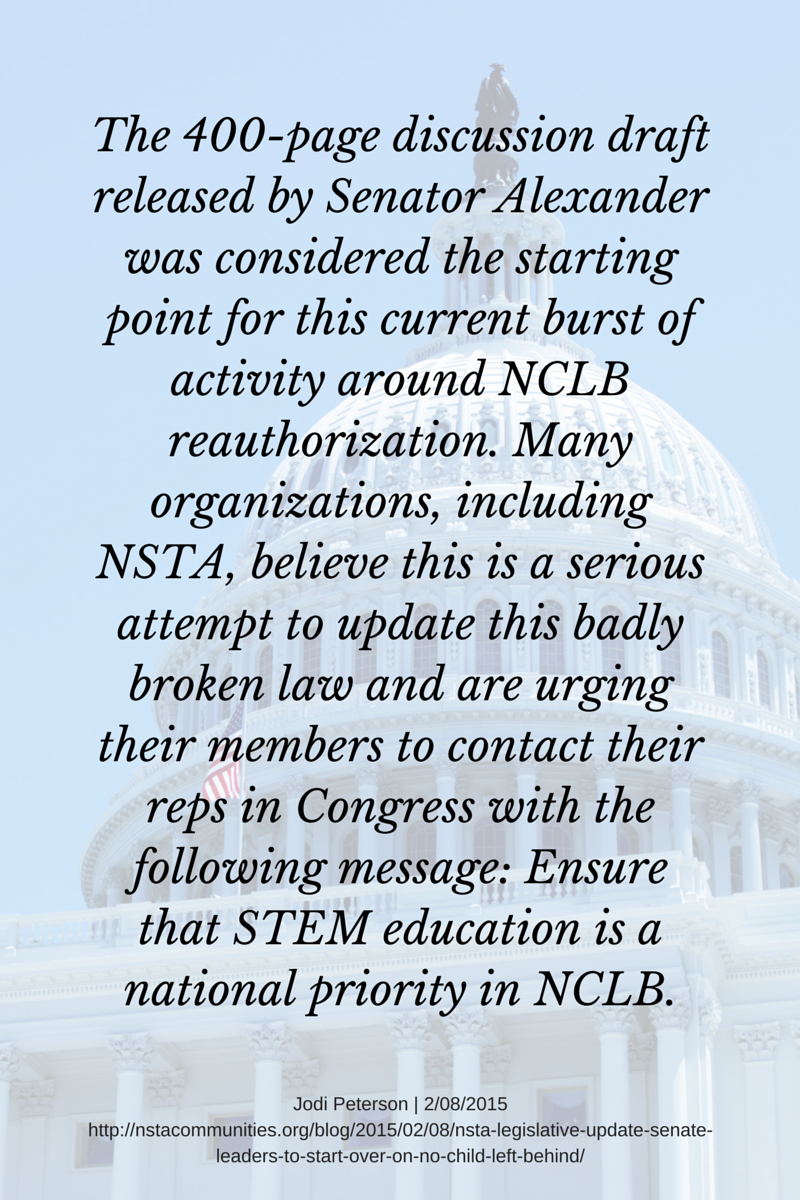Legislative Update
Senate Leaders to Start Over on No Child Left Behind
By Jodi Peterson
Posted on 2015-02-08
 Last week the Washington Post reported that Senator Lamar Alexander (R-TN) and Senator Patty Murray (D-WA), chair and ranking member of the Senate Health, Education, Labor & Pensions (HELP) Committee respectively, will work together to draft a bipartisan bill to reauthorize No Child Left Behind (NCLB), instead of working from a discussion draft bill introduced by Committee Chairman Lamar Alexander a few weeks ago and “they are determined to find common ground and draft a new law that will get bipartisan support.”
Last week the Washington Post reported that Senator Lamar Alexander (R-TN) and Senator Patty Murray (D-WA), chair and ranking member of the Senate Health, Education, Labor & Pensions (HELP) Committee respectively, will work together to draft a bipartisan bill to reauthorize No Child Left Behind (NCLB), instead of working from a discussion draft bill introduced by Committee Chairman Lamar Alexander a few weeks ago and “they are determined to find common ground and draft a new law that will get bipartisan support.”
As noted in a Jan. 19 blog post, the 400-page discussion draft released by Senator Alexander was considered the starting point for this current burst of activity around NCLB reauthorization. Many organizations, including NSTA, believe this is a serious attempt to update this badly broken law and are urging their members to contact their reps in Congress with the following message: Ensure that STEM education is a national priority in NCLB. Please use the STEM Education Coalition website and contact your members of Congress with this message.
With these new developments, it is highly unlikely that the Senate HELP committee will push out any NCLB legislation by the end of February.
Also last week, Republican education leaders in the House introduced their bill to replace No Child Left Behind. The Student Success Act (H.R. 5) will reduce the federal footprint and restore local control, while empowering parents and education leaders to hold schools accountable for effectively teaching students.
In other legislative news, the President’s budget released last week had some good news for science and STEM education:
- $3 billion for STEM education programs in total across 13 federal agencies, an increase of 3.6 percent over the 2015 enacted level
- $202.7 million for the existing Math and Science Partnership program, a $50 million increase over FY15. The budget also proposes reserving $25 million of this funding for competitive grants to support state and regional STEM networks and a reservation of 5% for “national” activities
- $125 million for a new program called Next Generation High Schools, which would promote the whole school transformation of high school education. The Department would place a strong focus on projects designed to improve readiness for college and careers in STEM fields, particularly for student groups historically underrepresented in those fields.
At the National Science Foundation,funding for the NSF’s Education and Human Resources Directorate is proposed at $962.57 million, an increase of $96 million of 11.2% over FY 2015. Funding for the STEM+Computer Science Partnerships Program is proposed for $64 million, an increase of $7 million. [This includes $52 million from EHR and $12.5 million from the Computing Research Directorate (CISE).]
Stay tuned and look for upcoming issues of NSTA Express for the latest information on developments in Washington, DC.
Jodi Peterson is Assistant Executive Director of Legislative Affairs for the National Science Teachers Association (NSTA) and Chair of the STEM Education Coalition. e-mail Jodi at jpeterson@nsta.org; follower her on Twitter at @stemedadvocate.
The mission of NSTA is to promote excellence and innovation in science teaching and learning for all.
Follow NSTA
Disclaimer: The views expressed in this blog post are those of the author(s) and do not necessarily reflect the official position of the National Science Teaching Association (NSTA).


